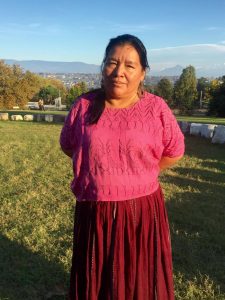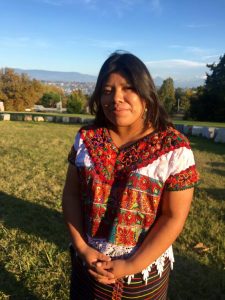
On 17 September 2016, Angélica Choc, indigenous Maya Q’eqchi leader from El Estor (Guatemala), woke up at 3am disturbed by what sounded like warning shots. She was too afraid to knock on her son’s room. Instead, she took a lamp and tried sending signals to him through the glass window. When her son realised the danger they were in, they both left their house as quickly and quietly as possible.
The next morning, ammunition shells of different sizes were found around their property. Angélica was devastated when she saw the holes in her house’s walls. After collecting the bullets, she reported the attack to the authorities, who scolded her for collecting evidence from the crime scene. Without proof, the case will be stuck forever.
A month later, she flew to Geneva to speak about corporate abuse against Guatemala’s indigenous communities at the United Nations. She did so both in the context of the second session of the Intergovernmental Working Group mandated to draft a Treaty on Transnational Corporations and other business enterprises (24-28 October), and at the lunch briefing for the CEDAW Committee’s review of Canada (24 October.)
Earlier this week, Angélica also attended the UN Forum on Business and Human Rights (14-16 November 2016) where she talked about her experience seeking justice and her shared thoughts on comprehensive reparations.
Landmark lawsuits
Angélica has been involved in defending indigenous peoples’ rights and women’s rights for years. Her human rights activism became a personal struggle when, on 27 September 2009, Adolfo Ich Chamán, her husband, was murdered by security personnel employed by the CGN (Compañía Guatemalteca del Níquel), a subsidiary of the Canadian company HudBay Minerals, operating on their lands.
She then became involved with the case of 11 women who had been gang raped during forced evictions carried out by police, military, and the mining company’s private security forces in El Estor (see Case Lote 8 in WILPF publication). Both cases were taken to Guatemala’s courts and then to Canada’s. It’s the first time in history that Guatemalan indigenous people – women in this case – are heard both at national and international levels. The cases, however, are still pending.

“We believe that Canadian courts can do something with respect to this,” Angélica states. “We, as women, deserve to be respected and, as indigenous women, we have all the rights to live in our communities because we are the ones who work the land.”
Always accompanied by the strength of her ancestors, Angélica emphasises the importance of including indigenous peoples’ rights in the elaboration of this treaty. “I am aware that indigenous communities in Guatemala are not taken into account,” says the Q’eqchi woman.
With the charisma typical of a natural leader, she courageously remarks that her struggle is for the benefit of everyone, “for my grandchildren, and for the children of my grandchildren. This struggle is not mine, it is for my country, for the women, for the entire world because women suffer not just in Guatemala, but also in different parts of the world.”
During the week of plenary discussions, meetings, and side events at the intergovernmental working group, Angélica was accompanied by psychologist Débora Yancoba. Débora is an indigenous Kaqchikel psychologist from Guatemala working at ECAP (Equipo de Estudios Comunitarios y Acción Psicosocial), conducting psychological support to women who suffered from sexual-violence during the armed conflict (see WILPF publication on the Case Zepur Sarco) and, most recently, to the 11 women of Case Lote 8.
Double discrimination

Indigenous communities are victims of forced and violent evictions. Débora explains that the State armed forces are seen at the service of mining companies while communities’ leaders are pursued, oppressed, and murdered. “They say that [the presence of the State armed forces] is needed for security reasons; but the truth is that they exercise oppressive control against indigenous communities,” she remarks.
Débora adds that women victims of sexual violence are often intimidated, stigmatised, and rejected by their husbands. They lose the leadership in their communities, something of which corporations take advantage to keep the population divided. Thus, on top of suffering double discrimination – as women and as indigenous people – indigenous women have also to endure a family and social struggle.
Obstacles to access to justice
Débora also argues that besides the very low rate of literacy among indigenous women in Guatemala, one of the most relevant obstacles to access to justice is the lack of translators to their mother tongue in the legal system (24 languages are spoken nowadays in Guatemala).
“The discrimination by employees in the Guatemalan judiciary system is very strong,” she says, explaining that the discrimination achieves its highest level when they are not even allowed to use the toilets within judicial facilities.
Another barrier in the access to justice is the lack of legal advice to look after indigenous peoples’ interests: “it is very difficult to find lawyers who understand the cultural relevance when working with indigenous communities.”
Successes and challenges
Small steps forward have been taken. A network of indigenous women has been created as a consequence of this conflict; they organise around agriculture, health, or cultural activities where they feel at ease to talk about their private lives. Therefore, many women have been able to publicly report sexual abuses and violations.
Most importantly, Débora explains, the legacy that these women are leaving for the future generations is a lesson to be transmitted from generations to generations. “It’s being quite functional. Many young women are now involved while understanding the reason of this resistance”.
The significance of a treaty on treaty on transnational corporations and other business enterprises
“We hope that a treaty can contribute to providing a legal basis for indigenous peoples to be able to defend their land but also their ability to get access to justice,” says Débora, emphasising the need for the treaty to take into account the specific issues relating to indigenous peoples. The treaty should contribute to clarifying “the responsibility of the state both within and outside its territory”.

Note: the interviews for this article were made at the time of the second session of the intergovernmental working group mandated to draft a treaty on transnational corporations and business enterprises (24-28 October 2016).
The content above (interviews, text, photos and video) was elaborated by Ana Escaso.





